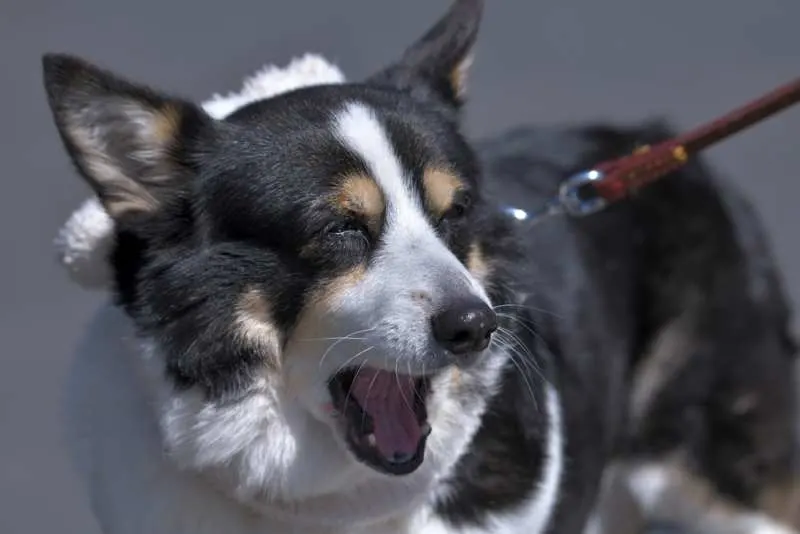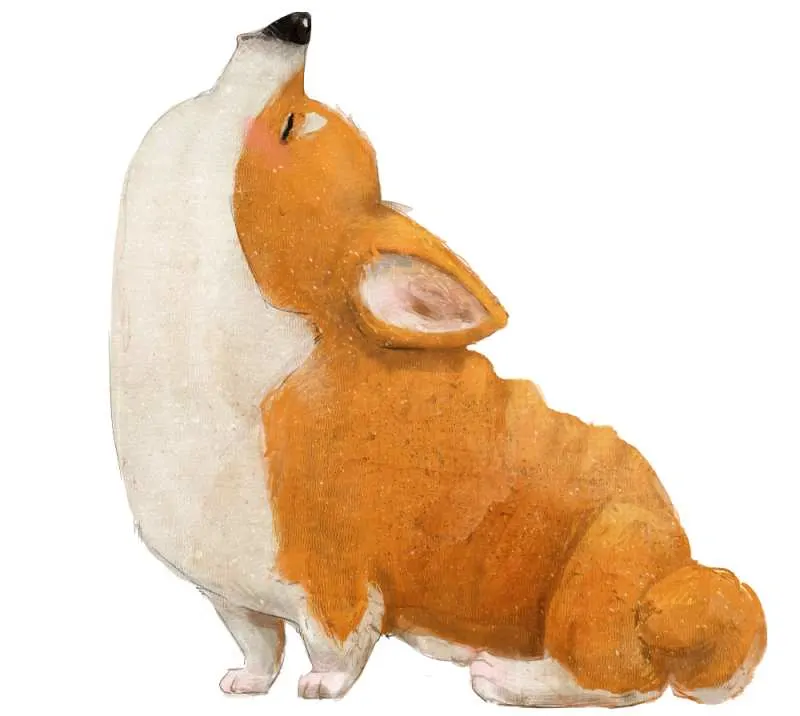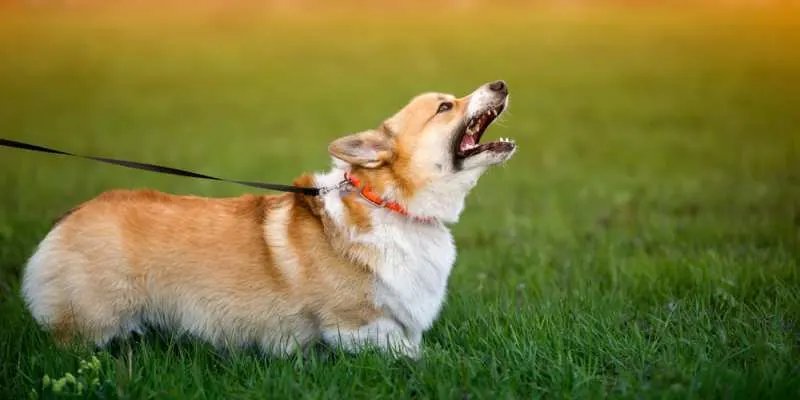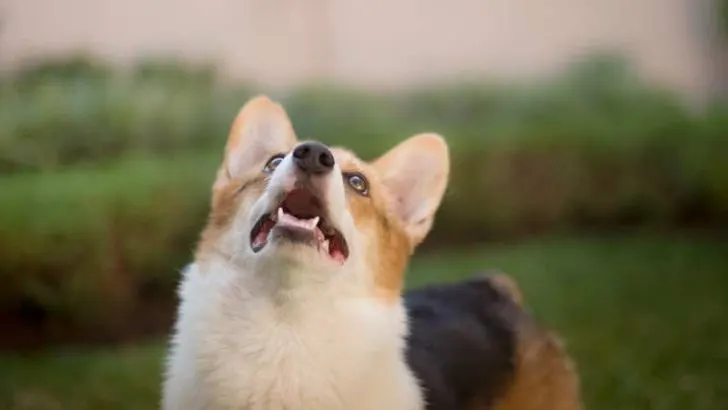Corgis are all-round loveable creatures, every owner knows this. They are little fun-loving balls of fur full of interesting characteristics. One of those are the weird noises they make. If you have a corgi, you know what I’m talking about.
So, since you’re here, you obviously must have wondered “Why does my corgi make weird noises”. You’re not the only one, don’t worry. There are many reasons why this might be the case, and I’m here to tell you some of the main ones.
So, if you want to find out, keep reading. Let’s get into it!

Why Does My Corgi Make Weird Noises?
To put it simply, dogs make noises to communicate with their owners, other dogs and all of the other creatures out there. Us, humans have developed languages as means of communication. Even though dogs can’t quite speak them, they have found ways to say whatever it is that they want from us.
They have developed different ways to talk without actually talking. As an owner, it is incredibly important to decipher what it is that your dog is trying to communicate to you, in order to be able to give it to them.
Luckily, you’re in the right place. In the remainder of this article, I will go over some of the most common noises corgis make and try to help you understand your doggo better.
Cos, there’s nothing better than looking at your pup and knowing exactly what they need, right?

Corgis And Communication
Corgis are a very popular breed, so most people are very familiar with some of their most notable characteristics.
Corgis are dogs of character, they have a lot to say. As such, they have developed nuanced ways of saying what’s on their mind. Whether it’s communicating with the herd they’re guarding, or with their owners, corgis have the exact method ready.
Many of corgis’ sounds are similar to those of other dog breeds, but they also make some that might not be as present with others. Here is a list of both:
Growling
If you have ever come in contact with a dog, you have probably heard them growl. As kids, most of us were taught that when a dog growls, they are angry. And, while in some situations that might be true, it isn’t always the case.
Context is key.
First and foremost, you need to know your dog. While some communication cues have mostly universal meaning across all pupps, some dogs might be different. For this reason, you need to pay attention to the situations preceding your corgis growling in order to read it properly.
If your dog is just playing with you, and their mood is overall good, it’s most likely a sign of playfulness. You do need to be careful though, as sometimes these signs can be misread. The slightest change in your dog’s demeanor can give you the signal that their mood has changed and that they are no longer feeling playful.
On the other hand, growling can indicate aggression, just like we were taught when we were little. If your dog has socialization or temper issues, they can show aggression in many different situations.
It can happen when someone comes close to their food bowl while they are eating. It can also happen if they have territorial tendencies and someone wants to take one of their toys.
Protectiveness can also play a role in a dog’s aggression, especially when it comes to their humans or their territory. If your dog is showing aggression in any of these or other situations, it may be a sign of improper socialization. In these cases, it might be a good idea to look into training classes.
Fear is another possible cause of growling. When dogs feel intimidated, their survival instincts kick in and they do what they need in order to protect themselves. One of their tactics is intimidating whatever it is that’s scaring them.
In scenarios like these, it is crucial to decipher whether your dog is growling out of aggression or out of fear. The reason this is vital is because it affects your reaction.
So, again, knowing your dog and their behavioural characteristics is of utmost importance.

Howling
Just like with growling, howling can have many causes.
Your corgi might just like to make their presence known. They love attention, so announcing that they are there and ready to be showered in love and affection isn’t anything out of the ordinary for them.
Another reason dogs howl is because they want something. So, if your corgi keeps howling at you, maybe you should check their food and water bowls and see if they have everything they need.
Howling can also be a call to play. Corgis are exuberant, playful creatures who love spending time with their owners. For this reason, when your doggo is persistently howling at you next time, try grabbing their favourite toy and seeing their reaction.
Pig Noises
This one might be weird for non-corgi owners, but corgis sometimes make pig noises. They are actually called “reverse sneezing”.
What happens in these situations is that your dog’s throat muscles spasm and their soft palate is irritated. The reason this happens is because your dog has inhaled too much air through their nose at once. It is followed by a series of physiological reactions.
All of these can seem weird and worrisome to owners, but rest assured, it is not dangerous. Dogs of any breed can experience reverse sneezing, although it is more common in smaller breeds, especially in brachycephalic ones.
However, if you notice that your dog is experiencing this excessively, it might be a sign of allergies, infection, or something being stuck in their nose. In this case, it’s probably a good idea to pay a visit to the vet.
Sneezing
Dogs sneeze for the same reason we do – they inhaled something irritating or overpowering and they want it out. This is the most common reason. That’s not all, though.
Did you really think it would be that simple? Not when it comes to dogs.
Fortunately, it’s usually a good sign. Dogs sneeze for many reasons – as a calming signal, when they want attention, when they are feeling playful, if they have an amazing sense of smell, and so on.
Basically, in almost all situations, sneezes are good and not a reason to worry by any means.

Barking
Barking is probably the most common way for dogs to communicate. It covers a wide variety of emotions and requests, so it is important to read the situation to be able to know why exactly your dog is barking.
In terms of what it might be signaling, barking is similar to growling. Oftentimes, dogs will bark to communicate with other dogs. This is their language and they understand each other very well.
Owners sometimes get worried when their dog starts barking at other pupps, but it isn’t always necessarily a bad thing. If you know your dog, you will probably be able to tell what kind of a mood they’re in and if there are any signs of aggression in their behaviour.
Sometimes, it can just be their way of saying hello, or inviting others to play.
If barking is coming from another dog though, the situation might not be the most comfortable, since you don’t know that dog nor their behavioural patterns. You can still try to read their body language if that’s something you’re good at, and gauge the situation.
However, when this happens, it might be best to leave the situation if possible. At the end of the day, it’s better to be safe than sorry.
Barking can also be your corgi’s call for attention. They might just be bored or lonely and wanting some tummy scratches. So, if you have been busy with some work for the past couple of hours, try sitting down for a bit and enjoying some quality time with your pup.
Corgis, just like other dogs, also bark when they need or want something. Next time your dog is barking at you, glance at the clock – it might be time for a walk!
Wookie/Chewbacca Noises
These are one of the few noises reserved just for corgis. As we have established, corgis are very talkative. The “wookie” noise is just one of the ways they are expressing their emotions.
Most commonly, the emotion behind this noise is excitement. Sometimes, corgis get so happy that they don’t know how to show it and just end up making this funny noise.
So, the next time you hear your corgi sounding like chewbacca, know that you have a happy corgi on your hands.

Conclusion
Corgis have a lot to say, and they have lots and lots of ways to do that. We, as their owners, want to know what it is they are saying. Sometimes, though, dogs’ ways of communicating just go over our heads and we might wonder “Why does my corgi make weird noises?”.
So, to be able to decipher what exactly it is they’re trying to tell you, here is a quick rundown of some of the noises your dog might be making and what they mean:
- Dogs can growl for many reasons, some good, some bad, but the most important thing is to read the situation and know your dog.
- The same goes for barking.
- Howling is similar, but it is rarely an indicator of something bad.
- Sneezing can mean a wide range of things, most of them great, so no worries here.
- Wookie noises are basically trademarked by corgis and are usually a sign of excitement.
Now that you have a handbook on weird corgi noises and what to expect from them, I’ll leave you and your corgi to have a nice, long conversation with some treats here and there. Have fun!

